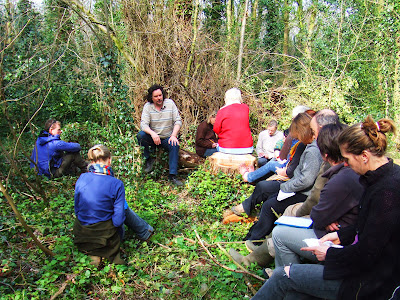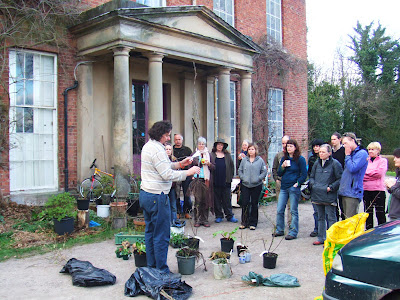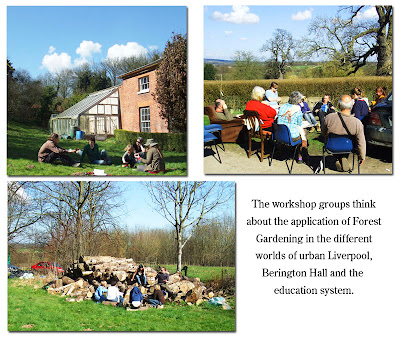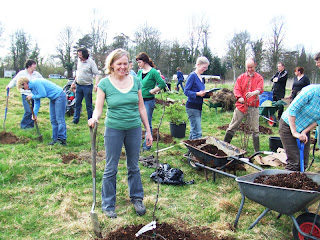Matt Richards posted these links from his friend Tim Richard's Blog - great to see so much stuff going on:
Global Ecovillage Network – find one near you: http://gen.ecovillage.org/
* Fellowship for Intentional Communities – find one near you: http://directory.ic.org/
* Eurotopia – find an intentional community or ecovillage in Europe: http://www.eurotopia.de/
* Worldwide Permaculture Network – the Facebook of Permaculture; find people and projects: http://www.permacultureglobal.com/
PAGES
- Home/Blog
- Treflach - Lfe on a Farm in Transition
- Growing Your Own Wherever You Are
- The Forest Way of Sustainable Living
- Woodwork in Sustainable Living - Yurts, Roundhouses etc
- Permaculture and Living Sustainably
- My Therapy and Healing Work
- Lightworkers Group - Thursdays 9.00 to 9.45 pm UK time
- CONTACT IAN
Friday, March 25, 2011
Saturday, March 19, 2011
PERMACULTURE - TREFLACH TWO
!! UNIQUE OPPORTUNITY - BOOK NOW !!
We are back at Treflach, Farm in Transition, for a second two-week Permaculture Design Course running from May 8th to 21st, 2011. Our first course there was inspirational, empowering and lots of fun for all, see earlier post: October 2010, Treflach.Farmer Ian Steele is already grappling with the issues that will force change on us all. As he said himself, "Peak Oil has already happened for us, every time I hear a tractor start up my heart sinks because I know we can't afford the diesel". Ian has already started to implement some of the ideas the course participants came up with on the October course. This is a unique opportunity to study many urgent issues: Transition/Energy Descent, Peak Oil, Food Security, Community Land Access amongst many others.
Permaculture gives us a framework for observing and working with natural patterns and processes. From there we can design and build truly sustainable systems for all aspects of our lives.
The course will mainly be taught by Steve Jones who takes endless trouble to work with all participants' interests and backgrounds. Guest sessions will be given by others including Chris Dixon who has had many fascinating insights through his own work at Tir Penrhos Isaf.
I hope to be doing a presentation on design, Tai Chi and Chi Kung in the mornings and just helping the show along generally.
MORE DETAILS AND BOOKING AT SECTOR39 HERE.
Informed Comment on Japan Nuclear Crisis
 | |
| Act of Desperation |
Roundhouse Reciprocating Roof Up
We are absolutely delighted to have the roof poles up on the roundhouse at Cwm Harry, it's a triumph of co-operation and it's been a really interesting experience for me and lots of fun too.
1. The gentleman in the middle of the photo is Clive Newman who has many years of experience of working on unusual buildings at CAT. Clive's help was really valuable in setting out the angles for the poles and also in general advice on fixings, turf roofs etc etc - thank you Clive!
2. Once we had the first pole up we judged the layout for the rest by eye and bolted them together at the top.
3. Pole number ten being eased into place.
4. With all eleven poles in place forming a circle with each one resting on its neighbour and all well bolted down the great moment comes when Steve removes the inital support and....
5. ...voila! Triumph! Not only does it stay up but it also feels very solid; Richie has a victory walk up onto the finished frame.
1. The gentleman in the middle of the photo is Clive Newman who has many years of experience of working on unusual buildings at CAT. Clive's help was really valuable in setting out the angles for the poles and also in general advice on fixings, turf roofs etc etc - thank you Clive!
2. Once we had the first pole up we judged the layout for the rest by eye and bolted them together at the top.
3. Pole number ten being eased into place.
4. With all eleven poles in place forming a circle with each one resting on its neighbour and all well bolted down the great moment comes when Steve removes the inital support and....
5. ...voila! Triumph! Not only does it stay up but it also feels very solid; Richie has a victory walk up onto the finished frame.
Two-Day Forest Gardening Course at Berington Hall
This is Berington Hall set in about twenty acres of land near Shrewsbury and home of the Crabapple Community - more about them on the Diggers and Dreamers website. The community is going well with eight adult and five child members but with room for more if you're interested. Nettie from the community got in touch with us asking if we would like to teach a Forest Garden course there, which we were delighted to do. The hall is a Georgian building and times were very different when it was built, it's an interesting challenge in itself to live there in the present day let alone the complexities of managing the land. The community have made a big investment in a giant wood fired heating system which has made living there much more comfortable but does use a lot of wood...
 |
| Some of the many tons of wood the new heating sytem uses. A clay book in a workshop in the stable block to the rear of the house. |
 |
| The Forest Classroom, easy to observe the features of a forest at Berington. |
 |
| Steve talks about some of the plants that are at home in the forest and how they fit into the different layers of the system. |
We had a long practical session on the second day with many trees, bushes, herbs as well as rooty and ground covery things to plant but with so many people working together we got loads done.
Many thanks to Nettie, Stewart, Nickie, Stewart, Jo, Paul, Martin and Clive for all their hospitality and a fascinating insight into communal living in a grand old house. Thanks to the kids too for the daffodils!
Monday, March 14, 2011
So What Do We Do Now?
The world's going crazy... but here's a few ideas that can help us all whatever's round the corner:
Learn About Forest Gardening
If there's any single thing you can study that can help you to live more sustainably, almost wherever you are, it's Forest Gardening. Much of the Earth would revert to forest quite quickly if we left it alone. Forest Gardening shows us how to work with this natural process and steer it towards a stacked abundance of food, materials, medicinal herbs etc etc whether you have several acres of field to work with, a city garden or even just a nearby roundabout or wasteland on which to do a little guerrilla gardening. This way of managing land is abundant, drought resistant, pest and disease resistant, low maintenance, builds and conserves soils and builds bio-diversity. It's already helping people in Nepal, Africa, India, Jordan and many other countries. More about Forest Gardening on separate blog page here.
Prepare to Share
If Mankind has any future on the Earth, it's going to be based on co-operation not on competition. People say that human nature won't change but that's seems just like giving up to me. They can't have felt what it's like when people work together putting their hearts into a project and they can't have seen what can be achieved. So look into formal co-operatives for land and housing management or just get together with people locally to do stuff. See more about Co-ops here.
Get Better Access to Land
Where does your food come from? Here in Powys we produce just a tiny fraction, less than 5%, of the food we consume - how secure is that? Much of the land here is currently a sheep-grazed desert and many farmers are struggling to pay their increased input costs - so how do we make the transition to secure, locally grown, land friendly food? Well check out what can be achieved on an acre of ex-industrial wasteland here: Cwm Harry Community Garden.
Think about your Energy Use
How would it effect you if your fuel quadrupled in price? It's not that far-fetched; in 1973 a 4% drop in the production of oil lead to just that, a quadrupling of the oil price and general upheaval. If you're locked into using a lot of electricity, petrol and gas you're getting more and more vulnerable. We're dependent on oil/gas energy for our food (ten calories of fossil fuel used for every single food calorie) let alone water treatment and supply, travel, heating, pharmaceuticals, plastics etc etc. And is it right to be complicit in the support of regimes like Gaddahfi's or the rape of Nigeria anyway? How would you cope say you had a ration of just 10% of the fuel you use at the moment? By the way, is anyone still keen on building more nuclear power stations? George Monbiot hitting the nail on the head about oil and Saudi Arabia here.
And General Ideas
What else is going to be useful as and when the power down comes? Here's a few suggestions:
Learn About Forest Gardening
If there's any single thing you can study that can help you to live more sustainably, almost wherever you are, it's Forest Gardening. Much of the Earth would revert to forest quite quickly if we left it alone. Forest Gardening shows us how to work with this natural process and steer it towards a stacked abundance of food, materials, medicinal herbs etc etc whether you have several acres of field to work with, a city garden or even just a nearby roundabout or wasteland on which to do a little guerrilla gardening. This way of managing land is abundant, drought resistant, pest and disease resistant, low maintenance, builds and conserves soils and builds bio-diversity. It's already helping people in Nepal, Africa, India, Jordan and many other countries. More about Forest Gardening on separate blog page here.
Prepare to Share
If Mankind has any future on the Earth, it's going to be based on co-operation not on competition. People say that human nature won't change but that's seems just like giving up to me. They can't have felt what it's like when people work together putting their hearts into a project and they can't have seen what can be achieved. So look into formal co-operatives for land and housing management or just get together with people locally to do stuff. See more about Co-ops here.
Get Better Access to Land
Where does your food come from? Here in Powys we produce just a tiny fraction, less than 5%, of the food we consume - how secure is that? Much of the land here is currently a sheep-grazed desert and many farmers are struggling to pay their increased input costs - so how do we make the transition to secure, locally grown, land friendly food? Well check out what can be achieved on an acre of ex-industrial wasteland here: Cwm Harry Community Garden.
Think about your Energy Use
How would it effect you if your fuel quadrupled in price? It's not that far-fetched; in 1973 a 4% drop in the production of oil lead to just that, a quadrupling of the oil price and general upheaval. If you're locked into using a lot of electricity, petrol and gas you're getting more and more vulnerable. We're dependent on oil/gas energy for our food (ten calories of fossil fuel used for every single food calorie) let alone water treatment and supply, travel, heating, pharmaceuticals, plastics etc etc. And is it right to be complicit in the support of regimes like Gaddahfi's or the rape of Nigeria anyway? How would you cope say you had a ration of just 10% of the fuel you use at the moment? By the way, is anyone still keen on building more nuclear power stations? George Monbiot hitting the nail on the head about oil and Saudi Arabia here.
And General Ideas
What else is going to be useful as and when the power down comes? Here's a few suggestions:
- learn how to use hand tools
- health: check out your local complementary therapists
- grow some food - even if its just a few herbs in a window box to get you started
- get frugal, get resilient
- meet people, make friends and do stuff locally
- look into the idea that a shift in global consciousness is coming - it's one of my big hope for the future - you're welcome to join in my group meditation, more about that here
Subscribe to:
Posts (Atom)









